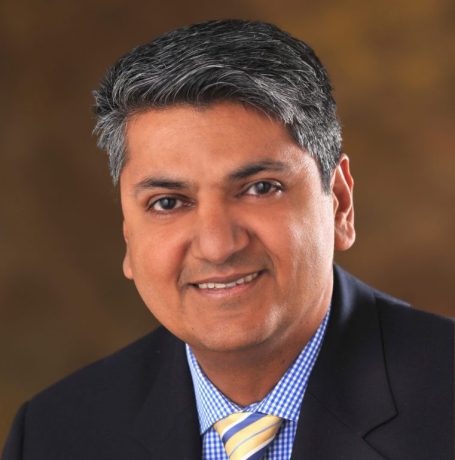Dr. Adhi Sharma, an experienced Emergency Medicine physician-leader, was selected last year by the hospital’s board of directors to assume the role of president of Mount Sinai South Nassau, the flagship Long Island hospital of the Mount Sinai Health System.
Dr. Sharma was previously Executive Vice President of Clinical and Professional Services and Chief Medical Officer. The hospital serves more than 900,000 residents along the South Shore and is a regional medical center known for stroke, cardiac, trauma and cancer care.
During the COVID-19 pandemic, Dr. Sharma helped guide the hospital’s response to the highly contagious and potentially deadly disease.
The hospital treated more than 9,700 patients while constantly working to ensure staff safety. Dr. Sharma also was among a key group of clinical leaders who kept the community informed by briefing the media directly.
A member of the American College of Emergency Medicine and American College of Medical Toxicology, serving on the practice and education committees respectively, Dr. Sharma launched his career in medicine at Elmhurst Hospital Center, where he was the Director of the Division of Toxicology and an attending physician in the emergency department from 2001-2005.
Dr. Sharma is a graduate of New York Medical College in Valhalla, New York, and completed his residency in Emergency Medicine at the Albert Einstein College of Medicine at Jacobi/Montefiore Medical Centers. He also completed a fellowship in Medical Toxicology at NYU/Bellevue. He is board certified in both Emergency Medicine and Medical Toxicology. Dr. Sharma also holds a master’s degree in Health Care Administration from George Washington University in Washington D.C.
1) How do you see your business evolving due to the changing times?
The COVID-19 pandemic has opened the door for hospitals and healthcare providers to change the way we deliver care. Telemedicine is one good example. Telemedicine is now available across the spectrum of our organization, including our physician practices and community-based specialty care centers.
It has substantially increased patients’ access to physician specialists; eliminated the scheduling of time-consuming physician office visits for routine check-ups and prescription renewals; and allowed for remote access of results for diagnostic tests, including lab work and radiology. Insurance carriers have also been partners in the growth of telemedicine, which they now pay at the same rate as a traditional patient visit.
This became possible in part because the government removed certain restrictions that had held us all back. This genie is not going back in the bottle. Telemedicine is convenient, patients and providers like it and it expands access to health care.
Also, the pandemic showed everyone that we need to maintain hospital capacity and depth of services, so we are able to expand when needed. The trend previously had been to reduce hospital capacity across the country in an effort to contain costs.
We support efficiency in health care, but the pandemic proved that we also need to be ready when the need arises. And you can’t build hospital and staff capacity overnight.
2) What advice would you give to other business owners?
The pandemic has taken a toll on everyone. Give your employees the room, support and flexibility they need to adjust to the new post-pandemic reality.
Employers should put an emphasis at this time on employee well-being to make sure their employees have what they need to return to work. We are very aware in health care of the long-term impact of the pandemic on our workforce. For many, it’s been traumatic. We will continue to make that a priority.

